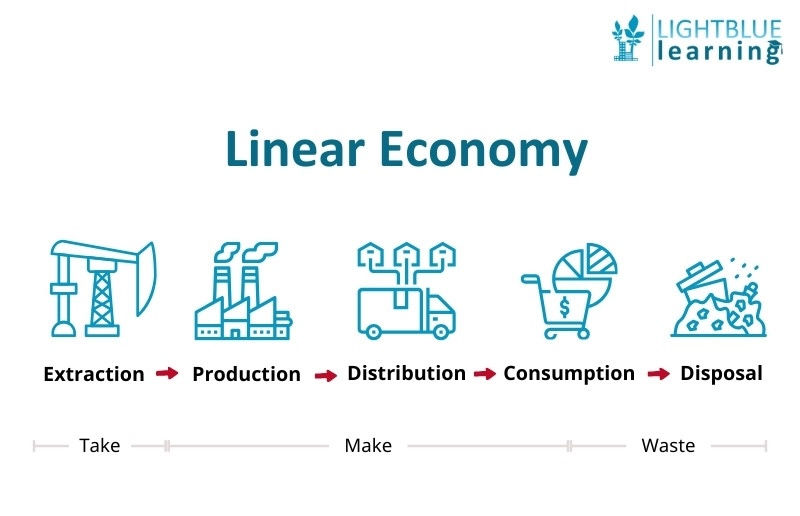
Here is a sneak preview of the first module of our Advanced Food Waste Course! In this unit, LightBlue CEO and founder Benjamin Lephilibert talks through how food waste reveals the cracks in our globalized, linear economy. He reveals how this model is not sustainable and highlights why we need to change the way we produce and consume food.
What is Linear Economy? Why it's called Linear Economic Model?
Today is really about the big picture and getting you to have the fundamentals before we dive further into the topic. Looking at things from a bird's eye perspective, we are still operating in a globalized linear economic model or Linear Economy.
Linear Economic Model relies on extraction, then followed by production, distribution, consumption, and disposal. We really apply this model to anything related to our economy with very little thinking related to the fact that the Earth is not flat and that disposing of our waste as if this was useful and normal and rational is missing the point.

The world cannot sustain this model. It was good enough in the seventies, and people made buckets of money with little thinking about the long-term consequences. Now, there are those long-term consequences, and we obviously see that it's no longer sustainable. So, we have to change that model because this model has put us in the situation we are in today, including Food Waste.
Food Waste is basically a byproduct or result of this mindset of Linear Economy. Those frames that we are applying, including on our foods, as if disposing of food is a normal, rational way to handle it. If you didn't eat it, or if you are over-purchased, it is just like being short-sighted and not having spent enough time thinking about this topic.
If you start changing your perspective on the topic of food and food waste. Whatever you do with it doesn't really matter because if you change your perspective, you will be more prone to do something about it. We are in this linear model that has created all these issues, and food waste, to us, is just one of those byproducts.
The UN had created Millennium Development Goals, the MDGs. There were eight of them. And what I find curious is that the way has evolved initially, those eight goals, it was only one which was specifically on UN environmental sustainability, then decided in 2015 to develop the Sustainable Development Goals (SDGs), 17 of them with much more elaborate and fleshed out objectives. There are also breaking down topics, that are much more specific and are actually directly related to the environment or sustainability in a way or another.

There is one fascinating specific model from the Stockholm Resilience Centre that is showing that food is connecting everything from the biosphere level, the society level to the economic level, and that's one of the only elements that is connecting those 17 sustainable development goals.
Not only does it show that there is a genuine benefit of looking at food as one of the topics that should really drag maximum attention, but as well as a reminder to us that food shouldn't be taken for granted.
As a generation, that's something that we tend to forget as we were all born in this period. Let's have a quick look at the video to remind us about Food.
Thanks for Reading! If you want to enroll on our advanced food waste course, visit our course page.
If you want to talk to us about tackling food waste in your business, get in touch with us via contact@lightblueconsulting.com.



Comments